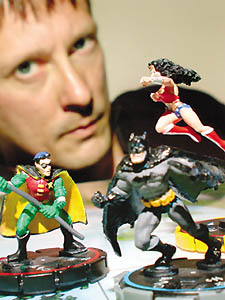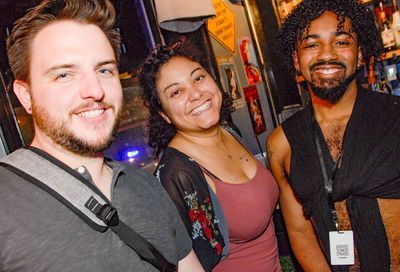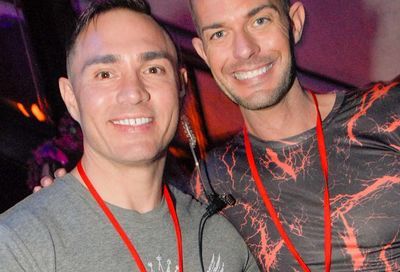Comic Sutra
The mythological draw of comic books
In the sixties he was a mad scientist.
In the eighties he was an evil businessman.
Today he is the President of the United States.
Long-time comic book aficionado Scipio Garling is recalling the many guises that Lex Luthor, Superman’s archenemy, has taken over the years. Each of those guises show how comics function, as he sees it, as “a bellwether of society.”
Garling has been reading comics for the better half of three decades. He believes comics are much more than fantasy novels. Beyond the vibrant colors, dynamic action and skintight costumes the story is what really captures his interest.
 |
On a cool summer morning Garling sits down at a shady caf&ecacute; table with a couple of comic books to talk about his love of a good storyline, why he wanted to start a discussion group of people whom have never meet, and Superboy’s genetics.
 “I’m still not sure I consider myself a collector,” he says. “I’m a reader. Comics themselves are just objects, it’s the stories in them that matter.”
For a man who can read Greek, Latin, French and Spanish it was hard for others to understand why his favorite genre was the comic book. “I had people shocked,” he says. “How could a Phi Beta Kappa classics scholar from an Ivy League college be into comics?”
His answer was simple, “How can a classics scholar not be into comics? They’re the Greek myths of today.”
The stories in both the classics and comics, he says, are parables for life. Comic books are ways of discussing abstract ideas while making them, “lighter, brighter, louder with clear lines drawn around characters.”
Although not every comic book is going to be a Philosophy 101 textbook Garling says, “Like any literature part of it what is there and part of it is what you bring to it.”
He had often talked with individual people about his affinity of the fantastic but says, “I wanted to turn those individual friends into a group of friends.”
Far from the forums of the Greeks, Garling would host his discussions in the abstract world of interwoven data that is the Internet. “I just started sending out e-mails talking about comic books to all the people at the same time and encouraged them to reply to all.” The group of 12 members started to take shape and over the next couple of years some who still had not met face to face would begin to know each other not by their personal lives but by the taste in comic books.
“It’s hard to sit around like the guests in Plato’s Republic and discuss abstract ideas of justice, philosophy and truth,” says Garling. “But you put us in a room and ask if that was the right thing Superman did in the last months issue — that’s a conversation. It’s something concrete.”
While the group freely discussed issues brought up in the comic books pertaining to race, religion, and sexuality members rarely discussed their own personal lives.
“I can remember once when we finally met for dinner one of the guys comes in and says to another guy ‘hey you’re black.'” While the comment was a simple observation, Garling says it illustrates how personal attributes just simply don’t come up. “Personal life is not evidence,” he says. He picks up one of the comics lying in front of him and says, “The evidence is on here.
“Comic books still believe in right and wrong, and good and evil,” he continues. And while it’s not always apparent which is which, he says, “that is why it is more important to discuss it than ever.”
Garling explains a recent debate surrounding the origin of Superboy. In the issue Superboy finds out he is a clone made with half of Superman’s DNA and half of his nemesis Lex Luthor’s DNA. Faced with the fact he has the genes of the worlds greatest hero and those of those of an evil genius, Superboy questions how much choice he will have in his future. Is he predestined for good or evil?
“It brings up the point of Nature versus Nurture,” which Garling says reflects on current debates about homosexuality. “Is it genetics or decisions?”
 “Like any in-depth conversation or subject matter, arguing about comics becomes arguing about philosophy,” he says. “That’s what myths do for us. They give us a mechanism to access much larger issues that would be harder to discuss abstractly.”
Support Metro Weekly’s Journalism
These are challenging times for news organizations. And yet it’s crucial we stay active and provide vital resources and information to both our local readers and the world. So won’t you please take a moment and consider supporting Metro Weekly with a membership? For as little as $5 a month, you can help ensure Metro Weekly magazine and MetroWeekly.com remain free, viable resources as we provide the best, most diverse, culturally-resonant LGBTQ coverage in both the D.C. region and around the world. Memberships come with exclusive perks and discounts, your own personal digital delivery of each week’s magazine (and an archive), access to our Member's Lounge when it launches this fall, and exclusive members-only items like Metro Weekly Membership Mugs and Tote Bags! Check out all our membership levels here and please join us today!





















